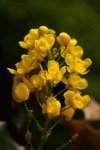| Scientific: | Mahonia aquifolium |
|---|---|
| Other: | Oregon Grape |
| Family: | Berberidaceae |
| Synonym: | Berberis aquifolium |
May be less effective than Hydrastis canadensis as an antimicrobial but more cost-effective for digestive complaints and chronic skin conditions.
Oregon grape contains berberine and other isoquinoline alkaloids responsible for its bitter taste and also its antimicrobial properties. It has similar constituents and actions as Hydrastis canadensis and other Berberis spp. As a digestive bitter, herbalists use barberry to improve digestive function to treat indigestion, gallstones and liver disease. Also, it's particularly useful for infections of the digestive tract including diarrhea caused by both bacteria and parasites. Research suggests the presents of flavonolignans in barberry inhibit multi-drug resistant pumps thereby working synergistically with berberine to over-come drug-resistant infections. Also, the flavonolignans possess hepatoprotective properties making them useful for liver diseases like hepatitis.
Most of the clinical trials conducted use berberine extracts rather than the herb. Berberine has shown benefit against diarrhea-predominant Irritable Bowel Syndrome (IBS-D) and associated micro-organism including Enterotoxigenic Escherichia coli (ETEC) diarrhea and giardia. Also, several studies suggest that berberine may improve blood sugar levels and may be useful in diabetes. Berberine inhibits cholesterol synthesis and may aid in heart disease. Human trials show it lowers liver enzymes and may be valuable in the treatment of non-alcoholic fatty liver disease (NAFLD).
Dermatologic
• poor digestion
• poor elimination causing 'bad blood'
• hives
• eczema
• psoriasis
• acne
Gastrointestinal
• digestive complaints
• dyspepsia
• hypochlorhydria
• gastric ulcer
• peptic ulcer
• colitis
• infection
Hepatobiliary
• cholestasis
• gallstones
• cholelithiasis
• cholecystitis
• biliary dyskinesia
• non-alcoholic fatty liver disease (NAFLD)
Infection
• bacteria
• yeast
• viruses
• parasites
• Alterative
• Bitter
• Stomachic
• Hepatic
• Cholagogue
• Choleretic
• MDR Pump Inhibitor
• Antimicrobial
• Antibacterial
• Antifungal
• Antiparasitic
• Antileishmanial
• Antiinflammatory
• Hepatoprotective
• Laxative (Mild)
• Emmenagogue
• Isoquinoline Alkaloids (E.g. Hydrastine, Berberine)
• Flavonolignans
• Tincture (1:5 in 40% EtOH): 1-4 ml tid
• Decoction (dried root): 1-2 tsp tid
Contraindications: Pregnancy and lactation (uterine stimulant). Berberine is considered teratogenic.
Caution: Hypertension, gastritis, peptic ulcers.
Hypertension: Caution use due to hypertensive and hypotensive effects; monitor BP regularly.
Gastritis, peptic ulcers: Stimulation of gastric secretions can irritate inflamed mucous membranes; concomitant ingestion of demulcent herbs can help prevent aggravation.
• MDR pump inhibitors • contains a flavolignin that inhibits multi-drug resistance pumps, which are responsible for making bacteria resistant to certain antibiotics and cancer resistant to specific chemotherapeutic agents. Therefore it may be a good adjunctive herb to prevent and/or overcome drug resistance.
• Barbiturate • may potentiate their effects.
Barnes J, Anderson LA, Phillipson JD. Herbal Medicines, 3rd ed. London: Pharmaceutical Press, 2007.
Bone K. Principles and Practice of Phytotherapy. Edinburgh: Churchill Livingstone, 2000.
Bone K. A Clinical Guide to Blending Liquid Herbs: Herbal Formulations for the Individual Patient. St Louis, MO: Churchill Livingstone, 2003.
Brinker F. The Toxicology of Botanical Medicines, 3rd ed. Sandy, Oregon: Eclectic Medical Publications, 2000.
Felter HW, Lloyd JU. King's American Dispensatory. 1898. http://www.ibiblio.org/herbmed/eclectic/kings/main.html. Accessed: August 19, 2006.
Hoffman D. Medical Herbalism. Rochester, Vermont: Healing Arts Press, 2003.
Weiss RF. Herbal Medicine. Beaconsfield, England: Beaconsfield Publishers Ltd, 1988.
Williamson EM, ed. Major Herbs of Ayurveda. Edinburgh: Churchill Livingstone, 2002
Disclaimer: This content is subject to change. The information is intended to inform and educate; it does not replace the medical evaluation, advice, diagnosis or treatment by a healthcare professional. www.nhpassist.com © 2014 NDAssist Inc. and/or its affiliates. All rights reserved.

|
Oregon Grape
SummaryMay be less effective than Hydrastis canadensis as an antimicrobial but more cost-effective for digestive complaints and chronic skin conditions. IndicationsSign in requiredActionsSign in requiredConstituentsSign in requiredPosologySign in requiredSafetySign in requiredInteractionsSign in requiredReferencesSign in required |
|---|